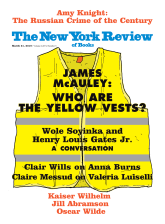1.
When we were stopped in Lviv, we needed air
and pulled the window down a bit.
A blade of bitter cold slid in; with it
a voice, an old man’s voice: “The children here…”
He paused to catch his breath a moment, “They…”
But we were off. For hours then all we saw
were fields and fields of luminescent snow.
And we heard nothing further till the day.
2.
From Ústí up to Dresden, in the night,
what seemed like crowds moved up and down the train,
their shuffling syncopated with the din
the wheels made on the rails. From left to right
the carriages tilted into every slope
along the Elbe’s twisting corridor.
Once someone tried the handle of our door,
thought better of it and we went back to sleep.
3.
Toward evening, the train came to a sudden stop
outside a village called Lesnoye. Silence.
Nothing stirring in the wooded highlands.
The houses and the buildings of the co-op
stockstill—or rather they warped and rusted and tore
at speeds so low their change escaped the eye.
Then we were off—the forest slipping by,
the dwellings moving normally once more.
4.
There was the time a child joined us a while.
Perhaps he’d lost his parents on the road.
Someone had lifted him out of the crowd
at Košice main station not a mile
behind (we’d seen most of those goings-on,
on the platform hundreds trying to board,
but just in time the carriage doors were barred).
We dozed a little. When we woke he was gone.
5.
In the Exclusion Zone, with curious ease
we sailed across wild meadows in the streets,
past concrete plains arrayed with fallen struts,
their structures open to the lightest breeze.
We’d heard that some came back in the belief
that they’d be better off where it occurred
—the authorities, it seemed, no longer cared—
like shadows moving through an afterlife.
6.
The populations moving, heavily laden.
In Kiev and in Warsaw we saw scores
of people, even children, on the squares
strewn in the way that sheaves in storms lie down.
A sigh gone from each body, they subsided,
gradually nudged and shifted by the stems
of different weeds, and by the ravening teams
of ants and maggots, till their flesh and blood dried out.
7.
We pulled the bunks down, spread the sheets across
and passed the bottle back and forth until
the rails rocked us to sleep. We were moving still
when sunlight broke over a field of grass,
a wrecking yard, or stretch of silver lake;
and moving still at speed through smaller towns,
the village stations done in creams and browns,
the red-capped station master’s drowsy look.
8.
We stopped at one called Nižbor toward the evening.
A child spoke to us in the local language.
We gave her sweets. The grass rose to the linkage.
Nearby, at a bar, people were leaving,
loud songs and loud good-byes. When they were gone,
silence but for a dog’s untroubled bark.
The railway tracks stretched off into the dark.
The lights clicked through their signals till the dawn.



